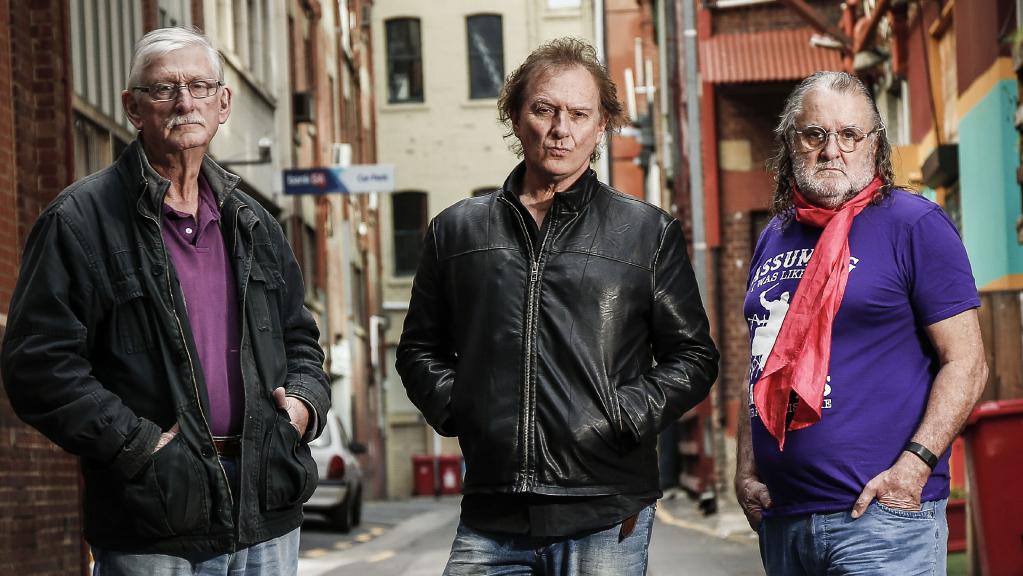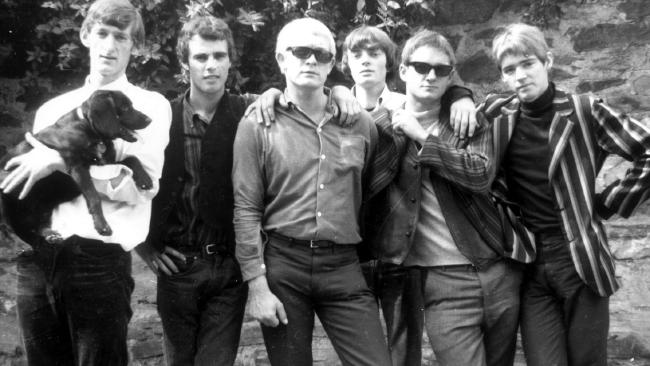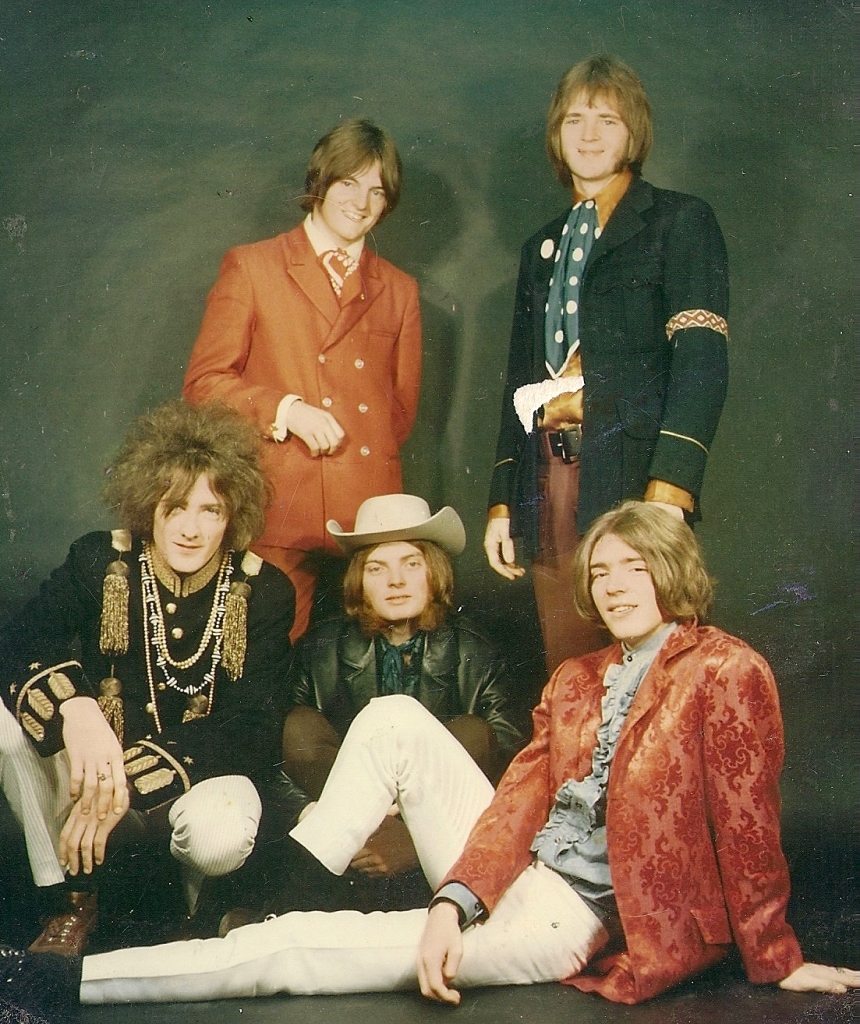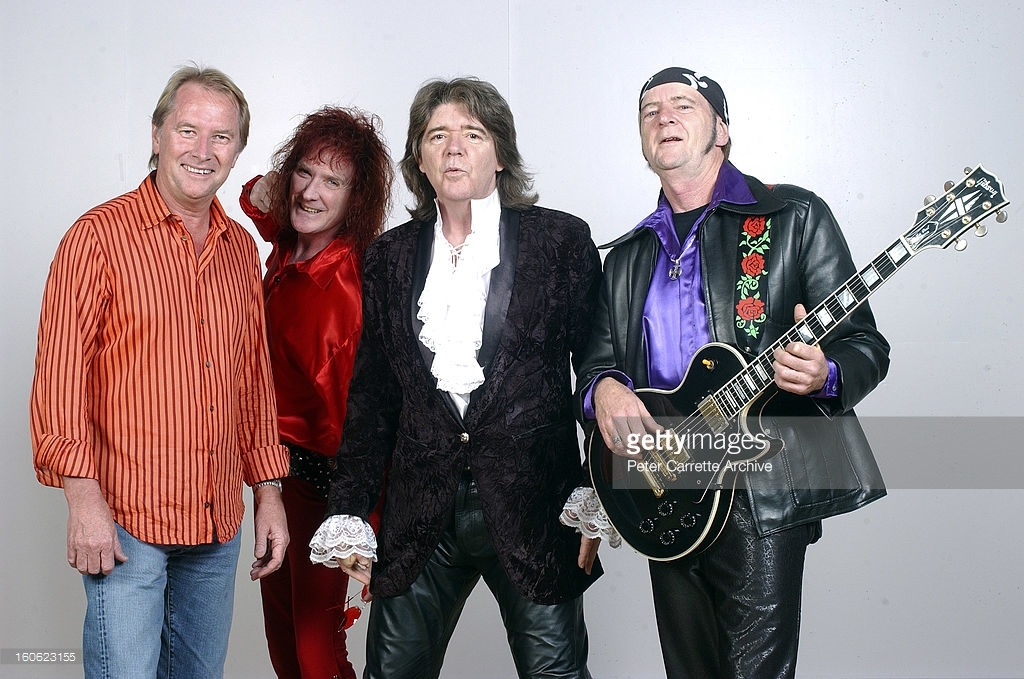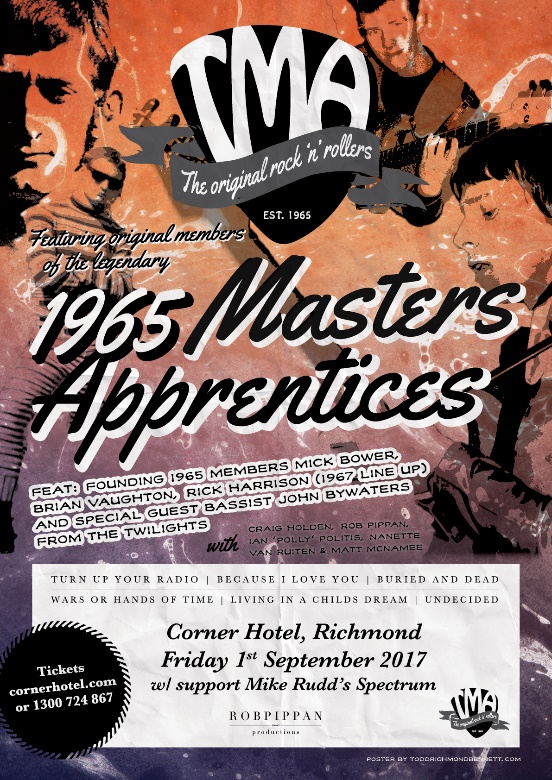Project Description
Interview with
BRIAN VAUGHTON
from
THE MASTERS APPRENTICES
Interview by Julie Ink-Slinger
.
Don’t miss this special part of music history as Mick Bower and Brian Vaughton perform in Melbourne for the first time in 50 years as the 1965 Masters Apprentices. Special guests Mike Rudd’s Spectrum will open this incredible night of rock n roll – tickets are on sale now.
.
Friday 1st September 2017
Corner Hotel, RICHMOND VIC
www.cornerhotel.com | 1300 724 867
.
.
The Masters Apprentices (or The Masters to fans) were an Australian pop/rock band fronted by Jim Keays on lead vocals, which formed in 1965 in Adelaide, South Australia, relocated to Melbourne in February 1967 and attempted to break into the United Kingdom market from 1970, before disbanding in 1972. Their popular Australian singles are “Undecided“, “Living in a Child’s Dream“, “5:10 Man”, “Think About Tomorrow Today”, “Turn Up Your Radio” and “Because I Love You”. The band launched the career of bass guitarist, Glenn Wheatley, later a music industry entrepreneur and an artist talent manager for both Little River Band and John Farnham. The band reformed periodically, including in 1987–1988 and again subsequently; they were inducted into the Australian Recording Industry Association (ARIA) Hall of Fame in 1998 alongside The Angels. Both Keays, with His Master’s Voice and Wheatley, with Paper Paradise, wrote memoirs in 1999 which included their experiences with the band.
Keays died from pneumonia related to multiple myeloma on 13 June 2014.
Julie Ink-Slinger catches up with original member Brian Vaughton and asks a few questions of this legendary band.
.
Founding Masters Apprentices Mick Bower, left,
and Brian Vaughton, right, with Rob Pippan.
.
J: The Mustangs were founded in Adelaide in 1964 and played instrumental/surf music. Did any of you feel that the surf sound was not the right fit for the band?
B: Not at the time, we played mainly The Shadows and we learned our trade from playing their music, with their precise timing and tone and their volume was the balance. It wasn’t until mid-’65 that we felt a change coming, a tsunami of music we called “The British Invasion”, you know? The Beatles and The Stones and so on, and the musical landscape shifted from 50s rock and roll and surf music to blues inspired rock and roll.
J: In 1965, Jim Keays became the lead vocalist of The Mustangs. What kind of impact did he have on the band?
B: Even though Jim had never been in a band before, he had the same thoughts as us as far as the beat-inspired musical direction the band should take, so he fit in really well.
.
The Masters Apprentices in the 1960s,
from left, Mick Bower, Rick Morrison, Graham Longley,
Gavin Webb, Brian Vaughton and Jim Keays.
.
J: Also in ‘65, you became The Masters Apprentices paying homage to master bluesmen including Chuck Berry, Muddy Waters and Bo Diddley. Can you explain why, during that particular time in the 60s, that British and Aussie bands were drawn to the blues?
B: It was a sort of revolution, wasn’t it? We were products of the Second World War and The Great Depression and money was tight. But our generation had it sweet, you know, things were changing, in all sorts of areas, including technology and music trends which we wanted to explore. The bluesmen in the early twentieth century suffered racism and bigotry and they wrote these experiences which appealed to my generation. The Stones did so well in taking from the blues boys and writing such great music, and other bands of the era started experimenting with music styles and sounds, creating their own identity. It was a very exciting time and the bands and fans responded positively to blues inspired rock and roll.
J: By 1966, you were a highly sought-after beat band in Adelaide, constantly playing to packed venues. At a gig you met Bobby of Bobby and Laurie who was impressed and recommended that Astor, his record label, check out your band. Astor requested a four-track demo, so your three songs turned into four as Bower and Morrison wrote Undecided in 15 minutes and, consequently, the band was signed. How did you all feel that in two short years, you progressed from a surf band to an in-demand beat band, signed to a major label?
B: I can’t recall the four tracks, I can only remember the two tracks: Wars or Hands of Time and the night before we recorded the songs, we wrote what became the single, Undecided. Rick came in with a riff, Michael put some chords on it, I put a beat to it, Jim had to write the words which he didn’t do, so he ad-libbed the entire song, we did 16 takes and had no name for the song so we called it Undecided because we couldn’t decide what to call it. And that song helped push the interest in rhythm and blues in Australia.
.
.
J: In August of ‘66, you made a trip to Melbourne which, at the time, was the centre of Australia’s music scene. You made a very favourable impression with performances at a couple of discos. In late ’66, you visited Melbourne again and Melbourne DJ, Stan Rofe, had Undecided on high rotation. How encouraged were you by such favourable reviews and by the fact that your fanbase had spread from Adelaide to Melbourne?
B: Well, we were pretty impressed. We were young and excited about the band’s future, and with eyes agog, we were in awe of Melbourne because it was the place to be if you were a band looking to “make it”, to become known. We stayed at The Sunshine Caravan Park and on the opposite side of the street was a café that sold the best hamburgers we had ever eaten.
J: Stan Rofe was such a supporter of the band that he announced, “The Masters Are to Australia what The Rolling Stones are to England, and The Doors are to America.” How did the band feel about Stan’s endorsement?
B: We were quite overwhelmed by even being mentioned in the same sentence as The Stones or The Doors. We were a pretty humble bunch of kids. But the band began to take off and much to Jim’s delight, in particular, countless numbers of girls wanted to hang out with us.
.
The Masters Apprentices
.
J: Your debut single “Undecided” / “Wars or Hands of Time” was released in October and steadily climbed the Adelaide charts, with strong support from local DJs. “Wars or Hands of Time”, a Bower composition, was the first Australian song to address the issue of the Vietnam War and how many young Australian lives were affected by the controversial introduction of conscription in 1965. It’s a powerful song with a powerful message. Were you concerned, at all, that you might be criticised by pro-Vietnam followers as having the audacity to write a song that condemns the US and Australian Governments?
B: We didn’t let that kind of negativity into our psyche. There were no “anti-The Masters Apprentices comments anywhere as far as we could tell. Along with Living in a Child’s Dream, I think “Wars or Hands of Time” was our best song.
J: From ’67 on, you have created a sizeable body of work. Do you have any treasured songs or albums you’d like to name and why you favour those particular songs or albums? As an aside, it may be considered unoriginal, but Because I Love You is one of my all-time favourite Aussie love songs.
B: Yes that’s an iconic song and we always enjoy playing it because it’s such a much-loved song and the fans sing along to every word. Other than that, I can’t pinpoint any favourite songs or albums, then again, there was a song on the B side of a single called “Theme for a Social Climber” and it’s an early release. I think it might be on the back of Buried and Dead. Now I think about it, my favourite of our hard rock songs is probably “Buried and Dead”. It’s different from most of our songs, it has a bit of the Yardbirds and a bit of The Who with a big build up and it’s structurally difficult, with no 12-bar blues, a couple of time changes. It took some work for us to get it right. We have to play it quickly these days in case we fall off the perch before we finish it, at our age.
.
.
J: Many 60s bands experimented with hallucinogenic drugs. The Masters also experimented with LSD some time later. Bower’s track, “Living in a Child’s Dream”, inspired by psychedelic drug use, continues to be thought of as one of your best pop songs. Do you agree with that assessment?
B: I don’t agree about the drug experimentation, but I do agree the song is one of our best pop songs. Michael is a craftsman as a songwriter and has a vivid imagination and can write about all kinds of experiences without having lived through them. We didn’t use drugs in those early years, we didn’t drink either, but we did smoke cigarettes and once, at a party, we were encouraged to dip the tip of our cigarette in Old Spice aftershave and while it did give us a kick, it also made us feel really sick. Drugs didn’t come along until later, in ’68.
J: While touring Tasmania In September ’67, Mick was hospitalised after having a nervous breakdown. His absence was felt by all of you because of his supreme musicianship and how prolific a songwriter he was. How did his absence effect the band?
B: I also saw Mick suffer in Adelaide. One of his qualities was that he was a disciplinarian, he was very demanding, and he controlled our practice sessions, punctuality, and what happened on stage including volume. His favourite expression regarding how the band should function was via “measured structure”. Once Mick left, the band’s discipline went out the window. We then experienced a number of line-up changes, even though a couple of records came out, the style of music changed and Jim formed the final line-up which created four hits including, “Because I Love You”, “Turn Up Your Radio”, “5.10 Man”, and “Elevator Driver”. He had Glenn Wheatley, Colin Burgess, Doug Ford, and Jim Keays.
.
.
J: You have mentioned that the band experienced several line-up changes over the years. What are the pros and cons of the switch up of band members?
B: The pros would include reinvigorating a band in terms of writing new material and experimenting with different styles of music and, hopefully, extending the life of the band’s career. If I use an analogy, possible cons might include the change of a chef in a restaurant. The eatery might look the same, but the food, even the same recipes, will taste different. Also, some band members might welcome new musicians and new sounds, but other members might want to retain the sound the band is known for and the sound that has proven so successful for so long. Like the saying goes, if it ain’t broke, don’t fix it.
J: You have toured extensively over the years. Are you as excited today by live performances as you were during the early years?
B: We all love playing to live audiences, the clapping and cheering and singing along to our songs. It’s quite a buzz and the energy from the audiences is palpable and uplifting. The band feeds off the audience and vice versa. We become one, at least that’s how it feels to me. And yes, I am just as excited to perform live these days as I was in the 60s. It never gets old.
.
Members of the band Masters Apprentices pose backstage
during the ‘Long Way To The Top’ concert tour at the
Sydney Entertainment Centre on September 15, 2002 in Sydney, Australia.
.
J: How does it feel to introduce your music to your fans’ children and, possibly, their grandchildren?
B: Looking out at the sea of faces, I recognise fans that are closer to my age, approaching 70, and those between 30 and 40 as well as twenty-somethings and teenagers. It’s a great feeling knowing that your music is embraced by people of all ages which really does indicate that our music stands the test of time and that we have a catalogue of well-crafted, well-liked songs.
J: You’ve done well.
B: Thank you.
J: Take care Brian.
B: You too Julie.
.
.
Experience a special part of music history as the 1965 Masters Apprentices rock The Corner this September – All The Hits, From Then & Now
.
First time band members Mick Bower & Brian Vaughton have shared the same stage in Melbourne in 50 years
.
.
Don’t miss this special part of music history as Mick Bower and Brian Vaughton perform in Melbourne for the first time in 50 years as the 1965 Masters Apprentices. Special guests Mike Rudd’s Spectrum will open this incredible night of rock n roll – tickets are on sale now.
.
Friday 1st September 2017
Corner Hotel, RICHMOND VIC
www.cornerhotel.com | 1300 724 867
.
AMNPLIFY – DB
.


